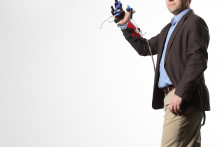I love it when I have trouble keeping up with my PhD candidates’, assistant professor of biomechatronics Arno Stienen states. ‘That means that they’re generating knowledge to the max.’ Stienen supervises PhDs at the UT and at Northwestern University in Chicago.
Fits like a glove
His career is centred around the development of robotic tools that assist patients with neurological conditions in their recovery or daily activities. ‘We develop a glove to help young males with Duchenne use their hands longer, as they lose strength over time. Our glove strengthens their movements to help them function as long as possible.’
Stienen hires his PhD candidates himself. ‘Obviously, I look at a person’s background and training. But motivation cannot be underestimated.’ The assistant professor stresses that doing a doctoral research isn’t a nine to five job. ‘It isn’t the final part of your education, but the first step of your research career. If you’re not willing to walk the extra mile to get to groundbreaking results at that point, then when will you be?’
The robotics expert enjoys working with his prospects, but sometimes struggles with the amount of guidance he should provide. ‘When you assist a person too much, you run the risk of reducing their sense of accomplishment and responsibility for a project. When you assist too little, the results may fall short.’
Motivation
Stienen learned that everyone, including PhDs, crosses a so-called ‘valley of demotivation’ when in a new job. ‘When you begin, you find that there is a lot you don’t know yet, which can take you aback.’ All PhD candidates have to get themselves through this phase. ‘I can guide them, but I cannot do the work for them. However, there comes a point when you discover that you’ve learned a lot about the job. That’s the point when your motivation goes back up and you’re leaving the valley.’
Many PhDs also get a motivational challenge in their final year, when they realise there is so much left to do. Stienen: ‘In the end, you’re judged on your publications. I advice all new PhDs to write a paper about a small, restricted area in the first year. If you can get published in the first year and repeat that in the second and third, you’ll have a relaxed fourth year.’







